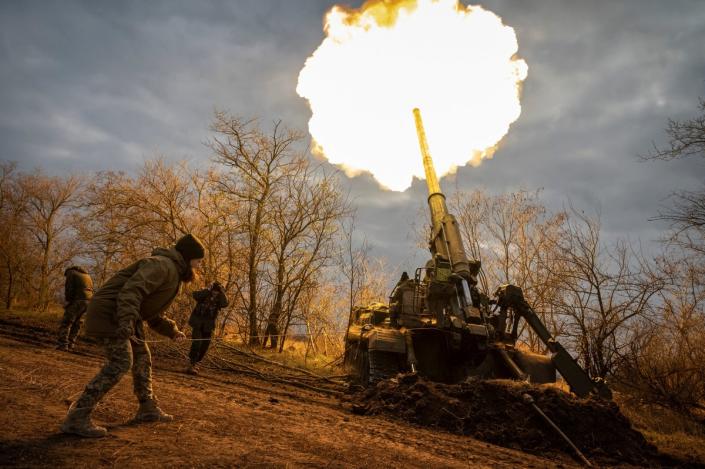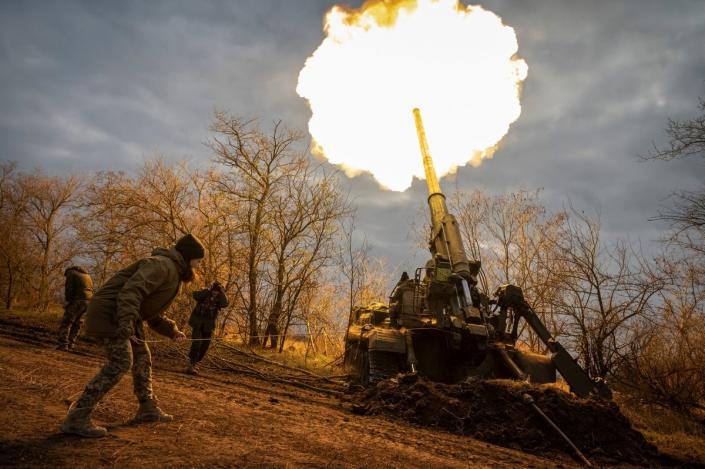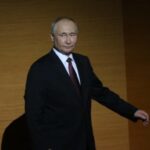
The irony of the Russian retreat from Kherson is that it’s the best decision Vladimir Putin’s generals have made since they launched their “special military operation” in February.
Remarkably, the humiliation was broadcast on state television (not that there are any independent news broadcasters), with bullet-headed generals telling an unhappy defence minister it’s all for the best. Tellingly, Mr Putin had a prior engagement. It was too much to expect him to have to approve publicly the abandonment of a city he had declared would be Russian for ever.
Rightly, the army judged that Kherson was indefensible, and that it threatened a considerable loss of men and materiel if the Russians tried to perform some sort of heroic last stand. The Russian military cannot afford further losses on that scale, and for once, common sense prevailed over stubbornness. The army has lost face, and the Ukrainians will obviously be delighted to liberate the regional capital. But moving the line of defence back to the eastern bank of the Dnipro River will make life more difficult for the Ukrainian military.
As before in history, winter and the sheer scale of the distances involved, with all the logistical difficulties thus implied, favour the defender. Volodymyr Zelensky’s forces have made excellent use of the armaments, training and intelligence supplied by the West, and their counterattacks have been impressive. Now, however, their progress may slow until after the first anniversary of the war in a few months’ time.
Things have moved on a great deal since Mr Putin made his dash for Kyiv only nine months ago. The fiction was that this was a war of liberation against Nazis, and a noble one at that. The likes of President Zelensky were supposed to flee to the West within hours, leaving behind a Ukraine that would happily agree to be incorporated into the Russian Federation, if not Russia itself.
Euphemisms as well as tanks rolled into action – this was not a war, still less an invasion, and the Ukrainians were about to gain their “freedom” from foreign, Western domination.
Now Russia has been left simply occupying and annexing the western territories it has managed to hang on to, and an end to the war is nowhere in sight. Russia’s only military tactic is terror, one way or another. The mass, indiscriminate bombing of civilians; rape, abduction, massacres; the murder of prisoners; the use of energy and food as weapons; the clumsy hints about nuclear weapons – all have been designed to destroy the resistance of the Ukrainian people and erode political support in the West. It has not worked.
To keep up to speed with all the latest opinions and comment, sign up to our free weekly Voices Dispatches newsletter by clicking here
Reportedly, the Russians are booby-trapping whatever they can in Kherson, so as to turn what remains of it into a “city of death”. It is no less than the world would expect, and it won’t make any difference.
The Russians are left fighting rearguard actions, militarily, economically and politically. By now, everyone can see that their nuclear threats are a bluff. They have certainly inflicted enormous harm on Ukraine, and economic pain on the West, but the sanctioning and isolating of Russia has proved effective. There is clear evidence – such as the public announcement of the retreat from Kherson, and in the talk among the hotheads that populate Moscow TV shows – that there is public dissent, at least about the disastrous conduct of the campaign, which seems to depend on recruiting mercenaries and convicts.
All the signs are that 2023 will bring further setbacks for President Putin’s badly led and poorly equipped forces, and very possibly some unfortunate consequences for the man himself.




